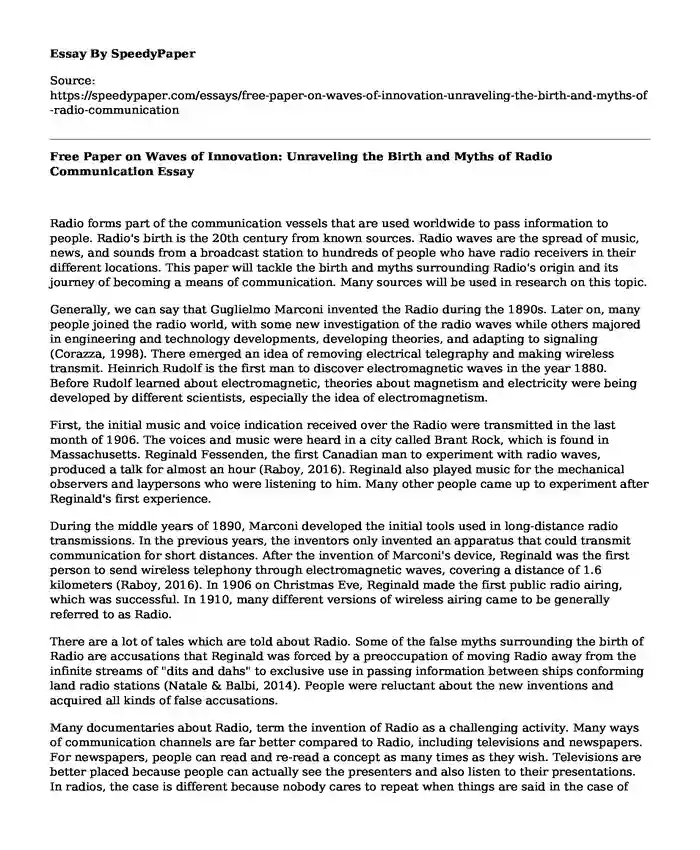
| Type of paper: | Essay |
| Categories: | History Communication |
| Pages: | 3 |
| Wordcount: | 664 words |
Radio forms part of the communication vessels that are used worldwide to pass information to people. Radio's birth is the 20th century from known sources. Radio waves are the spread of music, news, and sounds from a broadcast station to hundreds of people who have radio receivers in their different locations. This paper will tackle the birth and myths surrounding Radio's origin and its journey of becoming a means of communication. Many sources will be used in research on this topic.
Generally, we can say that Guglielmo Marconi invented the Radio during the 1890s. Later on, many people joined the radio world, with some new investigation of the radio waves while others majored in engineering and technology developments, developing theories, and adapting to signaling (Corazza, 1998). There emerged an idea of removing electrical telegraphy and making wireless transmit. Heinrich Rudolf is the first man to discover electromagnetic waves in the year 1880. Before Rudolf learned about electromagnetic, theories about magnetism and electricity were being developed by different scientists, especially the idea of electromagnetism.
First, the initial music and voice indication received over the Radio were transmitted in the last month of 1906. The voices and music were heard in a city called Brant Rock, which is found in Massachusetts. Reginald Fessenden, the first Canadian man to experiment with radio waves, produced a talk for almost an hour (Raboy, 2016). Reginald also played music for the mechanical observers and laypersons who were listening to him. Many other people came up to experiment after Reginald's first experience.
During the middle years of 1890, Marconi developed the initial tools used in long-distance radio transmissions. In the previous years, the inventors only invented an apparatus that could transmit communication for short distances. After the invention of Marconi's device, Reginald was the first person to send wireless telephony through electromagnetic waves, covering a distance of 1.6 kilometers (Raboy, 2016). In 1906 on Christmas Eve, Reginald made the first public radio airing, which was successful. In 1910, many different versions of wireless airing came to be generally referred to as Radio.
There are a lot of tales which are told about Radio. Some of the false myths surrounding the birth of Radio are accusations that Reginald was forced by a preoccupation of moving Radio away from the infinite streams of "dits and dahs" to exclusive use in passing information between ships conforming land radio stations (Natale & Balbi, 2014). People were reluctant about the new inventions and acquired all kinds of false accusations.
Many documentaries about Radio, term the invention of Radio as a challenging activity. Many ways of communication channels are far better compared to Radio, including televisions and newspapers. For newspapers, people can read and re-read a concept as many times as they wish. Televisions are better placed because people can actually see the presenters and also listen to their presentations. In radios, the case is different because nobody cares to repeat when things are said in the case of people who do not understand the "point'. Due to the comparison done above Radio is more of evocative media than informative media.
Conclusion
To sum up, Radio and other media channels have many myths and birth histories surrounding them. Marconi initiated radio inventions alongside other inventors who developed the ideas, and others invented many other tools of the radio ideology. The most crucial and essential thing is that people accept the image, and radio frequencies are worldwide.
References
Corazza, G. C. (1998). Marconi's history [radio communication]. Proceedings of the IEEE, 86(7), 1307-1311. https://ieeexplore.ieee.org/abstract/document/681364/
Natale, S., & Balbi, G. (2014). Media and the imaginary in history: The role of the fantastic in different stages of media change. Media History, 20(2), 203-218. https://www.tandfonline.com/doi/abs/10.1080/13688804.2014.898904.
Raboy, M. (2016). Marconi: The man who networked the world. Oxford University Press. https://books.google.com/books?hl=en&lr=&id=RqVHDAAAQBAJ&oi=fnd&pg=PP1&dq=marconi+radio+waves&ots=Hlq8WH3r0s&sig=5dJXOFyNA7q34GKztmIMUxnppUM
Cite this page
Free Paper on Waves of Innovation: Unraveling the Birth and Myths of Radio Communication. (2024, Jan 06). Retrieved from https://speedypaper.com/essays/free-paper-on-waves-of-innovation-unraveling-the-birth-and-myths-of-radio-communication
Request Removal
If you are the original author of this essay and no longer wish to have it published on the SpeedyPaper website, please click below to request its removal:
- Essay Sample for Students: Intercultural Training and Effectiveness
- Essay Example on The Beginning of Slavery in America
- Essay Example on Civil Rights Movement: The Revolution of Equality in America
- Why I Disagree With Robert Kaplan - Essay Sample
- Essay Example: Being a Yellow and Becoming a Successful Leader
- Babylonian Captivity: Jews Forced Exile & Return 598/7-587/6 BCE - Essay Sample
- Essay Example - Analysis of Communication Messages Using Goal Setting Theory at Workplace
Popular categories




